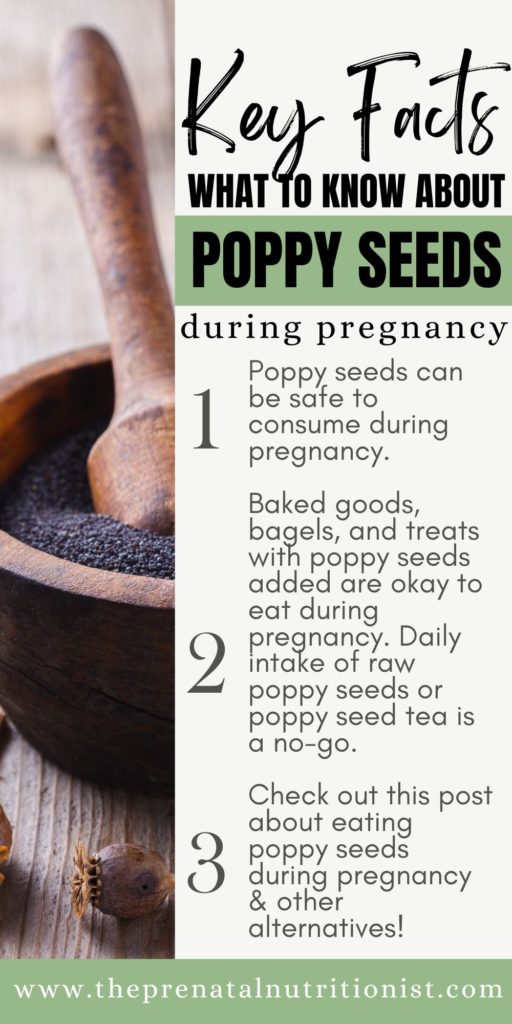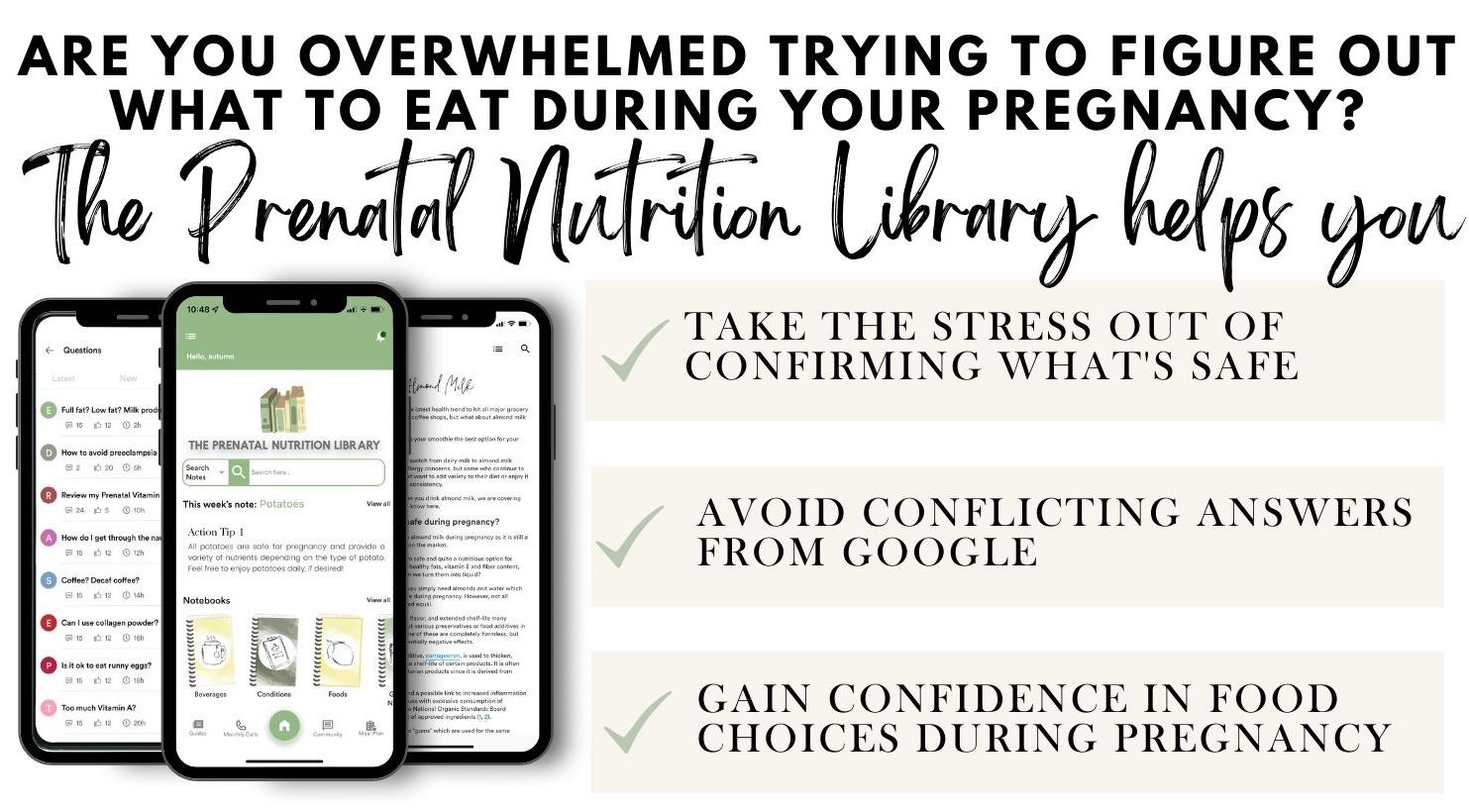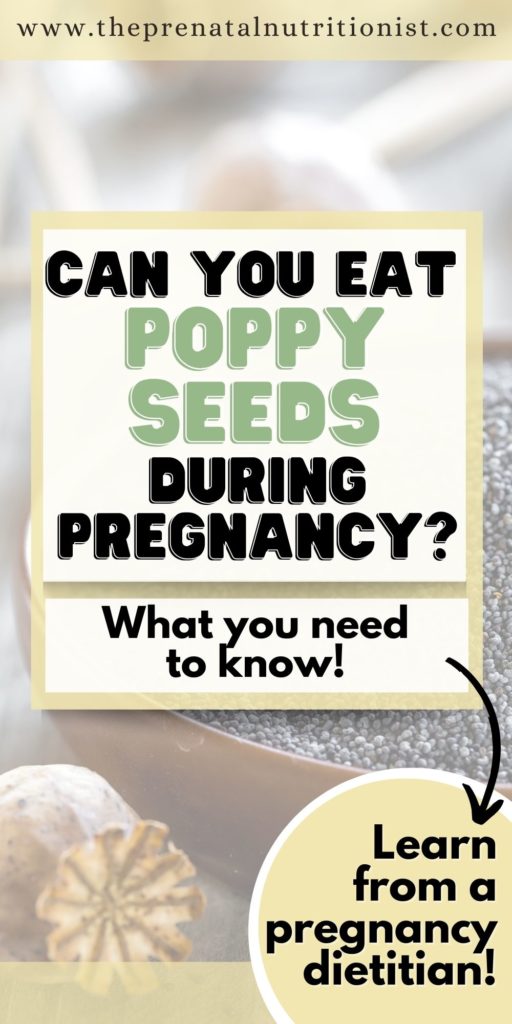
As you embark on this incredible journey toward welcoming your baby into the world, you’re probably encountering many pregnancy “do’s and don’ts,” am I right? It can feel like an endless list of rules to keep track of. There are the obvious ones, like steering clear of alcohol and cigarettes, but then there are those “head-scratchers” when it comes to certain foods.
You may have been given a generic handout discussing unpasteurized cheeses and deli meat. But who would’ve thought that something as innocuous as a lemon poppyseed muffin or an everything bagel could potentially raise some eyebrows? Yes, those teeny-tiny poppy seeds have somehow found themselves in the hot seat when it comes to foods pregnant women should avoid.
Poppy seeds have even been the accidental culprits behind causing some expectant moms to fail drug tests. Can you imagine the panic of getting that surprising result when eating poppy seeds was the culprit? It’s enough to make any pregnant woman question every tiny ingredient.
Since poppy seeds are popular in all kinds of global cuisines and baked goods, I’m dedicating this post to discussing whether it’s safe to eat poppy seeds while pregnant.
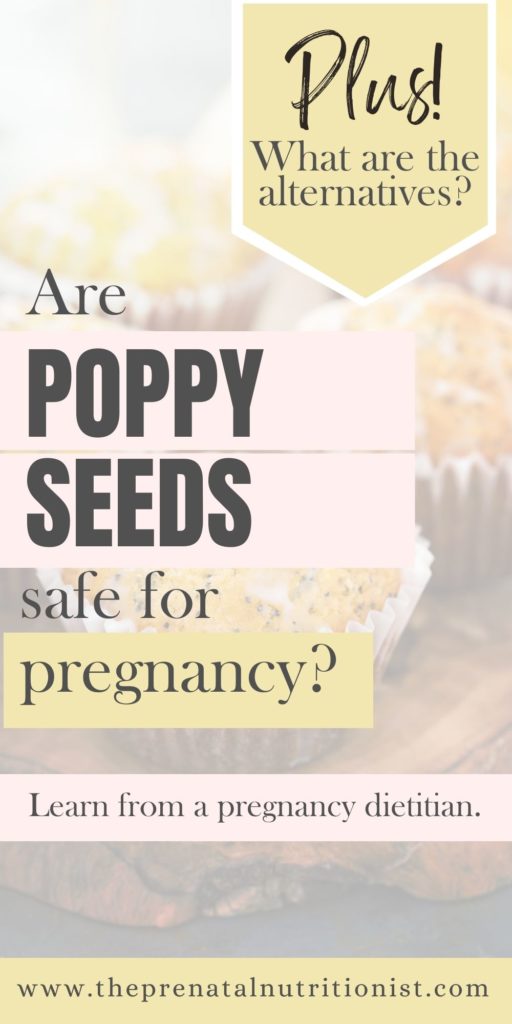
Poppy Seeds For Pregnancy: Everything You Need to Know
There’s no shortage of opinions and speculation when it comes to eating poppy seed-speckled treats during those precious nine months. Some say go for it, while others advise erring caution, leaving many moms-to-be feeling utterly confused.
Does all this buzz about poppy seeds and pregnancy actually hold any scientific weight? Or has it been blown way out of proportion by rumor mills and outdated information? More importantly, could indulging in a poppy seed bagel or sprinkled salad cause your unborn baby any harm?
Have no fear—I’ll be shedding more light on this topic to sort fact from fiction. I’ll also highlight which foods commonly contain poppy seeds and provide safe and tasty ways to satisfy those poppy seed cravings!
What are Poppy Seeds?
Poppy seeds are the edible, nutritious seeds of the opium poppy plant (Papaver somniferum). This is the same plant that is used to produce heavy-duty pain-relieving drugs like morphine and codeine. Now, before you raise your eyebrows, let me put your mind at some ease.
The poppy seeds themselves do not contain opiates. However, they can become contaminated with morphine residue during harvesting. Fortunately, poppy seeds used for baking and cooking are regulated and undergo a rigorous washing and procuring process to get the opiate residue off as best as possible.
Believed to have originated in the Mediterranean region, poppy seeds have been included in various cultural cuisines for centuries. They bring a delightful nutty flavor to the table, and texture-wise, they provide an irresistible crunch factor that just can’t be beat.
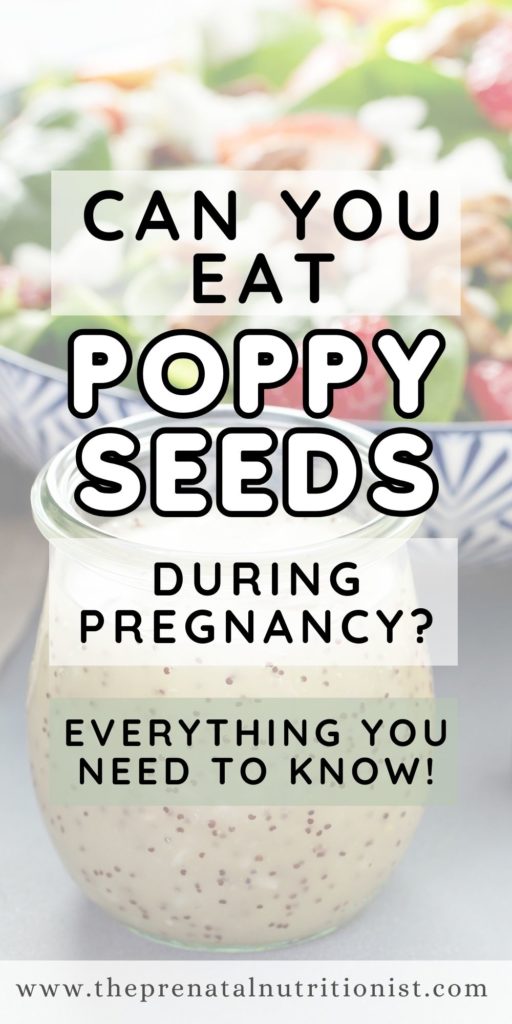
Are Poppy Seeds Safe for Pregnancy?
Now for the million-dollar question: are poppy seeds actually safe to consume during those precious nine months? Yes, they can be. Let’s discuss a few of the considerations for eating poppy seeds during pregnancy.
View this post on Instagram
Baked goods, bagels, and treats with poppy seeds added are safe to eat during pregnancy. The amount of poppy seeds in foods such as bagels and muffins is small, not raw, and is fine for consumption. As mentioned above, poppy seeds used for baking and cooking are regulated and undergo a rigorous washing process to remove the opiate residue as best as possible.
Daily intake of raw poppy seeds or poppy seed tea is a no-go. High amounts of poppy seeds could pose risks to both the mother and the baby because of their potent opium compounds. Additionally, avoid poppy seeds in supplement form during pregnancy. Some resources suggest avoiding poppy seeds 3-4 weeks before the baby arrives in the instance it shows up as opioids in blood work; this is common in urine screenings.
And that’s really the crux of the poppy seed pregnancy debate. While poppy seed consumption itself isn’t considered harmful, eating a large quantity could potentially pose risks or lead to ‘false-positive’ results for opiates during routine prenatal tests and drug screenings some hospitals require. However, this may not always be the case because poppy seeds will work their way through your system within a few hours. Additionally, modern medicine should be able to detect the difference between poppy seed consumption and drug use.
Now, what about the benefits?
Poppy seeds are a source of antioxidants and several micronutrients, including non-dairy calcium, copper, and manganese. They are also a source of some omega-3 fats and fiber to help keep you feeling satisfied and energized between meals or snacks. Also, according to the USDA, a single teaspoon of these tiny morsels meets about 3.3% of your daily calcium needs. They also offer a small boost of protein.
Foods with Poppy Seeds
Poppy seeds may be tiny, but they certainly make a big impact when adding flavor, crunch, and visual appeal to all sorts of dishes. Here are some of the most common culinary delights where you can find these yummy little seeds:
- Bagels
- Breads (poppy seed rolls, poppy seed loaves)
- Muffins (lemon poppy seed)
- Cakes
- Pastries
- Cookies
- Curries (Indian poppy seed curries)
- Salad dressings
- Marinades
- Spice rubs/crusts for proteins like chicken or fish
- Breaded coating
- Garnishes for soups, stews, and grain dishes
- Poppy seed oil
- Filling for pastries
- Poppy seed coating for donuts, Danish
- Poppy seed ice cream
- Seed milk/tea (popular in Middle Eastern cuisines)
Poppy Seed Alternatives
While poppy seeds are safe in moderate amounts during pregnancy, I get wanting other options. Luckily, plenty of tasty alternatives can provide that tasty delight and pack in good nutrition!
Below are some of the top contenders:
Hemp Seeds
Hemp seeds are small, nutty seeds packed with protein, omega-3 fatty acids, and other nutrients. They can be used in similar ways to poppy seeds and add a crunchy texture to dishes. Add ½ – 1 tablespoon hemp seeds to smoothies, oatmeal, toast, or yogurt.
Hemp seeds are made from the same plant species that marijuana is produced from, which is the Cannabis sativa L. plant. However, unlike marijuana, hemp seeds are from a different plant variety that does not have the same mind-altering capabilities as they only contain trace amounts of THC.
Flaxseeds
Flaxseeds contribute a pleasant nuttiness and loads of fiber and omega-3s. Be sure to buy ground flaxseeds or grind them yourself before eating to optimize nutrient absorption. Try having flaxseed during pregnancy in place of poppy seeds in muffins, breads, or oatmeal.
Chia Seeds
These little seeds have been gaining some serious attention lately, and for good reason. Packed with antioxidants, the perfect blend of fiber, some plant-based protein, and more nutritious goodness than you can imagine, it’s no wonder eating chia seeds during pregnancy is becoming a norm. Grab this pregnancy pantry staple here!
Sunflower Seeds
Buttery with a light, sweet nuttiness, sunflower seeds can easily be substituted for poppy seeds in both sweet and savory applications. They’re also an excellent source of vitamin E, moderate amounts of folate, and a small amount of omega-3 fatty acids.
Pumpkin Seeds
Pumpkin seeds or pepitas (roasted pumpkin seeds) deliver big time for a heartier crunch and flavor blast. Their earthy flavor is ideal for dishes like curries, grain bowls, and salads that could use a poppy seed stand-in. They are also rich in zinc, omega-3 fatty acids, magnesium, and antioxidants to benefit mother and baby.
Nuts
Walnuts, almonds, cashews, and more. These aren’t exactly the same flavor as poppy seeds but can be used in various ways and provide a great nutrition punch. Nuts are a safe option to eat during pregnancy. The great thing about nuts is that they can also be eaten on their own for a simple on-the-go snack.
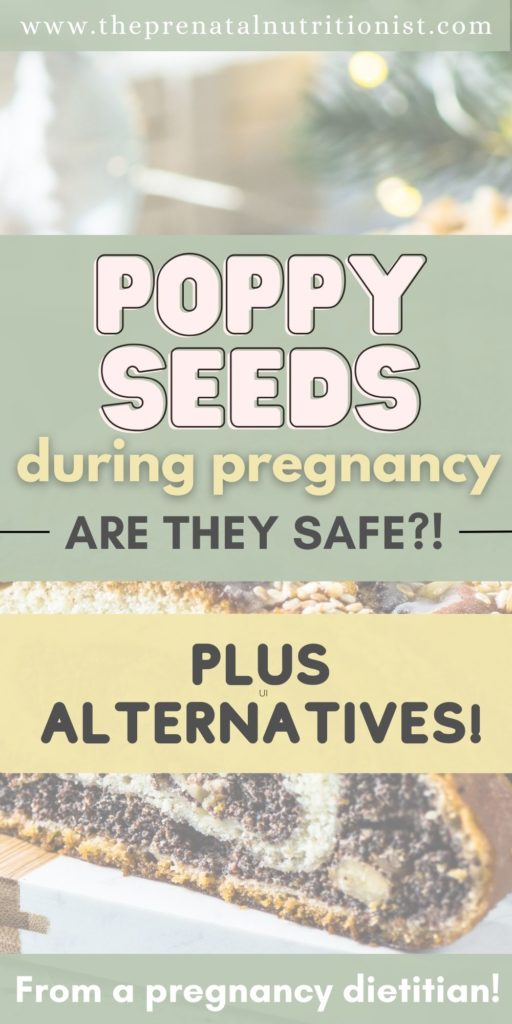
Pregnancy is a journey of growth, discovery, and nourishment for moms-to-be and the little lives growing inside them.
I hope this helped to provide clarity when navigating the whole poppy seed puzzle during these nine months. When it comes to nutrition during pregnancy, every expectant mother needs to weigh the potential benefits against any risks and ultimately make the call that fits her unique situation. And you know what? It’s okay to make the best-informed choice for YOU!
The good news is that you don’t have to figure it all out alone while swimming in an ocean of conflicting advice and outdated recommendations from online forums or your great-aunt. Having a trusted resource like The Prenatal Nutrition Library (TPNL) on your team is a total game-changer.
At TPNL, we aim to be your one-stop nutrition guide and give you real, evidence-based guidance you can trust. We’ll break down which foods might raise little caution flags and why, AND we offer expert-crafted, easy meal plans designed to remove the guesswork and nourish you and your little one at each stage.
Start your stress-free “eating for two” journey today by downloading our Free 1-Week Sample Meal Plan For Pregnancy! It’s the perfect little taste of how delicious and energizing your pregnancy diet can be with the right plan by your side.


